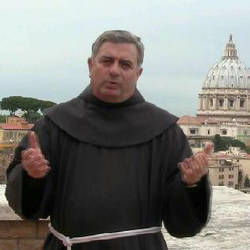Big news: Pope Francis, in a surprise move, has chosen the head of the Franciscans, Jose Rodriguez Carballo, to help lead the Congregation for Religious. (Technically, he has chosen the OFM's "Minister General" to be the "Secretary," the all-important Number Two person in the Congregation for the Institutes of Consecrated life and the Societies of Apostolic Life. The Secretary works under a cardinal-prefect but really carries out most of the day-to-day decision-making). This is the Vatican congregation that oversees all religious orders--men and women, and that would include oversight of the Leadership Conference of Women Religious (LCWR), which had been subject to a Vatican "doctrinal assessment," by the Congregation for the Doctrine of the Faith. It also comes in the wake of the Vatican's investigation of U.S. women's orders by the Congregation for Religious. There have been religious in this position before, but it is rare that the pope would appoint a current superior of an order. "Vatican Insider" reports this impetus: "Informed sources in Rome now say that by choosing Carballo, Pope Francis has clearly opted for a different, more Gospel-inspired approach to consecrated life in general and, also, to help overcome the ongoing, painful tensions with the American religious women." This should be welcome news for women religious. The full story is here.
Pope Appoints Franciscan Help Lead Congregation for Religious
Show Comments (
)
Comments are automatically closed two weeks after an article's initial publication. See our comments policy for more.
The latest from america
Frank Turnbull, S.J., a longtime editor at 'America' who died earlier this week, is remembered as a humble, quiet and yet forceful presence to those who knew him during his 85 years of life.
A Reflection for Saturday of the Fifteenth Week in Ordinary Time, by Zac Davis
Trauma-informed spirituality knows better than to promise that prayer will take away all the pain. But it can offer the hope that, even in the midst of pain, there can be moments of feeling whole.
Israeli Prime Minister Benjamin Netanyahu telephoned Pope Leo XIV, who urged Israel’s leader to revive negotiations and enact a ceasefire.








